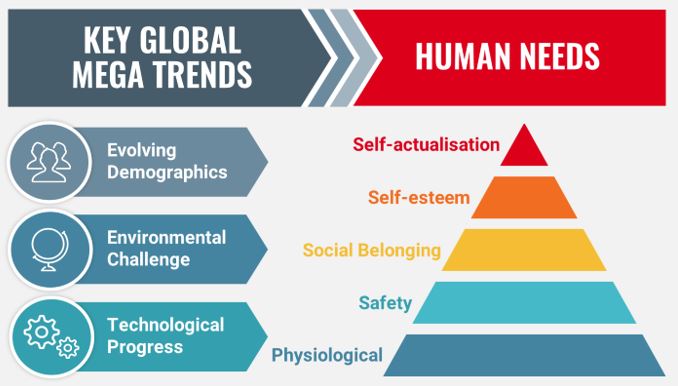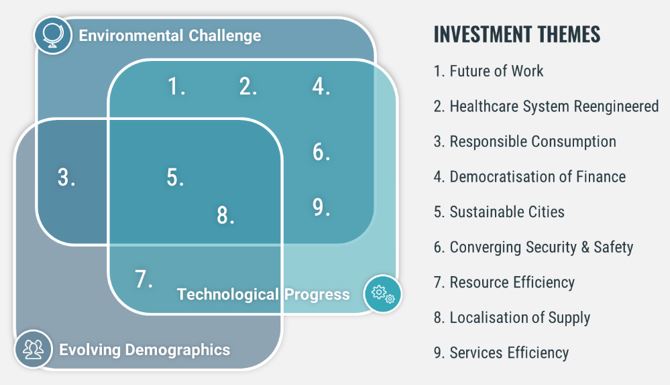PRIVATE EQUITY: FINDING VALUE IN UNCERTAIN TIMES
- Fundamental trends have become a key measure when assessing the long-term value of assets.
- We believe that investing in trends and themes helps make portfolios less susceptible to the vagaries of the macro and market environment.
- Three megatrends: Evolving Demographics, Environmental Challenges and Technological Progress drive the nine investment themes that we have identified in this paper.
- Two key investment themes are Responsible Consumption and Localisation of Supply.
Overview
In the decade since the global financial crisis (GFC) we have enjoyed a tremendous economic recovery, albeit with a few ups and downs, and markets have responded accordingly. However, the next decade is unlikely to be as positive and investors currently find themselves facing a number of risks:
- Further escalation of the US / China trade war: at the heart of this is the profound power struggle over technology and geopolitical dominance.
- A valuation bubble: after the strong run in recent years, valuations are at the top end and looking vulnerable.
- A slowdown in China: the country is not transforming its economic model quickly enough in the face of slowing exports, while high levels of indebtedness are also a worrying factor.
- Global recession: following one of the longest growth cycles since the Second World War, recent indicators are pointing to a slowdown, particularly in Europe.
Against this backdrop of uncertainty, how can investors find value?
Fundamental Trends Coming to the Fore
Over the course of the past decade, fundamental trends have overtaken macro / sector momentum in terms of importance. In fact, on the back of the strong and extended post-GFC recovery, fundamental trends have become a key measure when assessing the long-term value of assets. During the GFC, trend-driven companies actually proved to be more resilient to the macro environment, with small and mid-market companies better placed to capitalise on these trends, helped by the fact that they are often more focused pure plays.
Therefore, investors concerned about future returns and the resilience of their investments to the macro environment should look to build a portfolio of companies driven by strong fundamentals. Such a portfolio should not only achieve reduced correlations to both the economy and financial markets, but it should also be less prone to liquidity issues due to a lack of exits during any market correction. This is because such companies tend to remain strategic acquisition targets for both industrial and financial buyers throughout a cycle.

What are These Trends?
At Unigestion, we believe there are three overarching megatrends that investors should be focusing on:
- Evolving Demographics
- Environmental Challenges
- Technological Progress
All three of these megatrends are already having a significant impact on businesses and individuals across the globe, and their importance is only set to increase given their potential to profoundly alter the linearity of human needs, as shown in Figure 1.
Figure 1: Global Trends Set to Profoundly Alter Human Needs

Looking at each one briefly, with Evolving Demographics, we are talking about an ageing population that will lead to longer work lives and an increased need for multiple reskilling during an individual’s lifetime. There will also be an increased need for healthcare as well as for products and services specifically designed for the elderly. However, this megatrend goes beyond just an ageing population, with, for example, generational shifts and migration all set to have meaningful impacts.
Environmental Challenges covers everything from climate change, global warming and pollution through to the depletion of natural resources, while Technological Progress revolves around the integration of technology into our daily lives, impacting everything from work through to leisure and financial well-being.
Importantly, these megatrends will also create countertrends and therefore create further investment opportunities. For example, despite an increasingly high-tech world that revolves around social media, there is growing interest in board and card games as people look to regain old-fashioned social interaction.
Translating Trends into Investment Themes

The themes identified allow investors to pursue both returns and socially responsible investing.


While these are the overarching megatrends, we need to dig a little deeper to turn them into meaningful themes that investors can act upon. In Figure 2, our Private Equity investment team have identified nine such themes, with many being driven by more than just one megatrend.
Importantly, these themes largely tie in with the United Nation’s Sustainable Development Goals, which were created in 2015 with the aim of building a better world for future generations. Therefore, the themes identified allow investors to pursue both “strong returns” and “socially responsible investing”.
Figure 2: Private Equity Investment Themes

Naturally, the most robust of these themes will be the ones supported by multiple megatrends. As can be seen, Responsible Consumption and Localisation of Supply are two such themes.
In Responsible Consumption, we can identify a number of important drivers. With a growing awareness of the environmental impact of consumption and a desire for healthier lifestyles, there is a noticeable shift in consumer preferences toward more local, fair, sustainable and organic produce. Consumers also want to have everything, everywhere, increasing the needs for services and mobility. Investors can play this theme through a number of sectors, including food, textiles, leisure and travel, automotive and transport, and media and entertainment.
The theme of Responsible Consumption also ties into Localisation of Supply. The trend from global to local supply chains is gaining momentum, driven by a combination of more aware consumers and improved industrialisation, technology and logistics. Consumers and businesses are keen to see shorter supply chains to reduce transportation, lead times, supply risks and enhance resource efficiency. There is also a growing need to follow more stringent laws and standards around, for example, the supply of food, as well as new technologies allowing for smaller scale and more customised production. Industrials, transport/logistics, agriculture and textiles are among the sectors to benefit.

The most robust themes will be those supported by multiple megatrends.

Putting it All Together
At Unigestion, our Private Equity team has a solid track record of identifying trends and themes and turning them into alpha for our investors. We believe that a combination of top-down and bottom-up allows us to create portfolios for the long-term that should be less vulnerable to the vagaries of the macro environment and financial markets, driven instead by the tailwinds of the strong fundamental trends and investment themes identified.

A combination of top-down and bottom-up helps create more resilient portfolios.

Important Information
This document is provided to you on a confidential basis and must not be distributed, published, reproduced or disclosed, in whole or part, to any other person.
The information and data presented in this document may discuss general market activity or industry trends but is not intended to be relied upon as a forecast, research or investment advice. It is not a financial promotion and represents no offer, solicitation or recommendation of any kind, to invest in the strategies or in the investment vehicles it refers to. Some of the investment strategies described or alluded to herein may be construed as high risk and not readily realisable investments, which may experience substantial and sudden losses including total loss of investment.
The investment views, economic and market opinions or analysis expressed in this document present Unigestion’s judgement as at the date of publication without regard to the date on which you may access the information. There is no guarantee that these views and opinions expressed will be correct nor do they purport to be a complete description of the securities, markets and developments referred to in it. All information provided here is subject to change without notice. To the extent that this report contains statements about the future, such statements are forward-looking and subject to a number of risks and uncertainties, including, but not limited to, the impact of competitive products, market acceptance risks and other risks.
Data and graphical information herein are for information only and may have been derived from third party sources. Although we believe that the information obtained from public and third party sources to be reliable, we have not independently verified it and we therefore cannot guarantee its accuracy or completeness. As a result, no representation or warranty, expressed or implied, is or will be made by Unigestion in this respect and no responsibility or liability is or will be accepted. Unless otherwise stated, source is Unigestion. Past performance is not a guide to future performance. All investments contain risks, including total loss for the investor.
Unigestion SA is regulated by the Swiss Financial Market Supervisory Authority (FINMA). Unigestion (UK) Ltd is authorised and regulated by the Financial Conduct Authority (FCA) and SEC registered. Unigestion Asset Management (France) SA is regulated by the “Autorité des Marchés Financiers” (AMF). Unigestion (Luxembourg) SA is an Alternative Investment Fund Manager authorised by the Commission de Surveillance du Secteur Financier (CSSF) under the Luxembourg law of 12 July 2013 on AIFM. Unigestion Asset Management (Canada) Inc., with offices in Toronto and Montreal, is regulated in Canada by the securities regulatory authorities in Ontario, Quebec; Alberta, Manitoba, Saskatchewan, Nova Scotia, New Brunswick and British Columbia. Its principal regulator is the Ontario Securities Commission. Unigestion Asia Pte Ltd is regulated in Singapore by the MAS, as Capital Market Services (CMS) license holder and Exempt Financial Adviser under the Securities and Futures Act and Financial Advisers Act.
Document issued July 2019.
